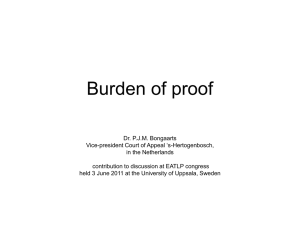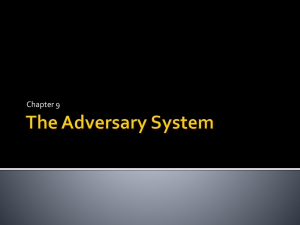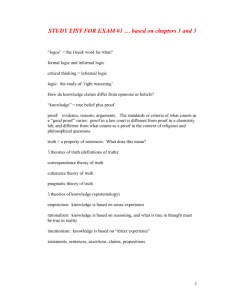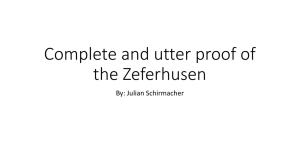PETER SHELDON-GREEN
advertisement
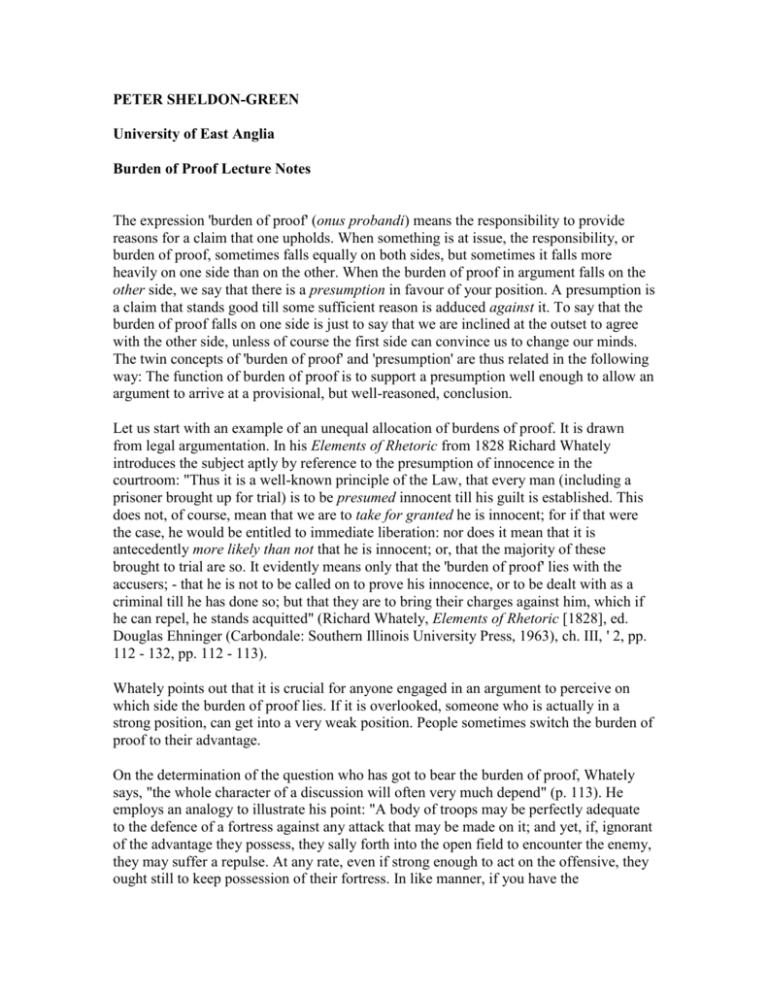
PETER SHELDON-GREEN University of East Anglia Burden of Proof Lecture Notes The expression 'burden of proof' (onus probandi) means the responsibility to provide reasons for a claim that one upholds. When something is at issue, the responsibility, or burden of proof, sometimes falls equally on both sides, but sometimes it falls more heavily on one side than on the other. When the burden of proof in argument falls on the other side, we say that there is a presumption in favour of your position. A presumption is a claim that stands good till some sufficient reason is adduced against it. To say that the burden of proof falls on one side is just to say that we are inclined at the outset to agree with the other side, unless of course the first side can convince us to change our minds. The twin concepts of 'burden of proof' and 'presumption' are thus related in the following way: The function of burden of proof is to support a presumption well enough to allow an argument to arrive at a provisional, but well-reasoned, conclusion. Let us start with an example of an unequal allocation of burdens of proof. It is drawn from legal argumentation. In his Elements of Rhetoric from 1828 Richard Whately introduces the subject aptly by reference to the presumption of innocence in the courtroom: "Thus it is a well-known principle of the Law, that every man (including a prisoner brought up for trial) is to be presumed innocent till his guilt is established. This does not, of course, mean that we are to take for granted he is innocent; for if that were the case, he would be entitled to immediate liberation: nor does it mean that it is antecedently more likely than not that he is innocent; or, that the majority of these brought to trial are so. It evidently means only that the 'burden of proof' lies with the accusers; - that he is not to be called on to prove his innocence, or to be dealt with as a criminal till he has done so; but that they are to bring their charges against him, which if he can repel, he stands acquitted" (Richard Whately, Elements of Rhetoric [1828], ed. Douglas Ehninger (Carbondale: Southern Illinois University Press, 1963), ch. III, ' 2, pp. 112 - 132, pp. 112 - 113). Whately points out that it is crucial for anyone engaged in an argument to perceive on which side the burden of proof lies. If it is overlooked, someone who is actually in a strong position, can get into a very weak position. People sometimes switch the burden of proof to their advantage. On the determination of the question who has got to bear the burden of proof, Whately says, "the whole character of a discussion will often very much depend" (p. 113). He employs an analogy to illustrate his point: "A body of troops may be perfectly adequate to the defence of a fortress against any attack that may be made on it; and yet, if, ignorant of the advantage they possess, they sally forth into the open field to encounter the enemy, they may suffer a repulse. At any rate, even if strong enough to act on the offensive, they ought still to keep possession of their fortress. In like manner, if you have the 'Presumption' on your side, and can but refute all the arguments brought against you, you have, for the present at least, gained a victory: but if you abandon this position, by suffering this Presumption to be forgotten, which is in fact leaving out one of, perhaps, your strongest arguments, you may appear to be making feeble attack, instead of a triumphant defense" (pp. 113 - 114). Whately then gives an example for the claim just illustrated by the military analogy. He refers back here to his paradeigm case, the presumption of innocence: "Let any one imagine a perfectly unsupported accusation of some offence to be brought against himself; and then let him imagine himself - instead of replying (as of course he would do) by a simple denial, and a defiance of his accuser to prove the charge, - setting himself to establish a negative, - taking on himself the burden of proving his own innocence, by collecting all the circumstances indicative of it that he can muster: and the result would be, in many cases, that this evidence would fall far short of establishing a certainty, and might even have the effect of raising a suspicion against him [Hence the French proverb, 'Qui s'excuse, s'accuse']; he having in fact kept out of sight the important circumstance, that these probabilities in one scale, though of no great weight perhaps in themselves, are to be weighed against absolutely nothing in the other scale" (p. 114). Are there any rules which tell us on which side the burden of proof falls? Whately claims that there are a some general classes of cases for which it is reasonable to allocate the burden of proof in an unequal way. The first class covers the instance just mentioned; it is the presumption of innocence. Whately claims that every person ought to be presumed harmless till something is proved against him. It is, he says, "a hardship to require a man to prove [...] that there is no ground for any accusation; or else to be denied the protection of his Country. The Burden of proof, in each case, lies fairly on the accuser" (p. 115). A second class is described by Whately in the following way: "There is a Presumption in favour of every existing institution. Many of these (we will suppose the majority) may be susceptible of alteration for the better; but still the 'Burden of proof' lies with him who proposes an alteration; simply on the ground that since a change is not a good in itself, he who demands a change should show cause for it. No one is called on (though he may find it advisable) to defend an existing institution, till some argument is adduced against it; and that argument ought in fairness to prove, not merely an actual inconvenience, but the possibility of change for the better" (p. 114). A third class is what Whately labels "Presumption against a Paradox": "There is a 'Presumption' against anything paradoxical, i.e. contrary to the prevailing opinion: it may be true; but the Burden of proof lies with him who maintains it; since men are not to be expected to abandon the prevailing belief till some reason is shown" (p. 115). But burdens of proof can be fulfilled, so the presumption against paradox does not mean, that a paradox is as such a bad thing. Whately rules this out as a misunderstanding of the idea of presumption. "[M]any are accustomed to apply 'Paradox' as if it were a term of reproach, and implied absurdity or falsity. But correct use is in favour of the etymological sense. If a Paradox is unsupported, it can claim no attention; but if false, it should be censured on that ground; but not for being new. If true, it is the more important, for being a truth not generally admitted. [...] Yet one often hears a charge of 'paradox and nonsense' brought forward, as if there were some close connexion between the two" (p. 115). With sarcasm, Whately adds: "And indeed, in one sense this is the case; for to those who are too dull, or too prejudiced, to admit any notion at variance with those they have been used to entertain (B " D • * ` > " < ), that may appear nonsense, which to others is sound sense" (p. 115). Whately's discussion of the presumption against paradox brings us closer to answering the question: How do we know where the burden of proof falls? What reasonable grounds would make us place the burden of proof more on one side of an issue than the other? There are a variety of such grounds, but they mainly fall into three kinds of categories: 1. Initial plausibility 2. Affirmative/negative 3. Special circumstances Ad 1. Initial plausibility. - The more a claim coincides with our background knowledge, the greater is its initial plausibility. The general rule that most often governs the placement of the burden of proof is simply this: The less initial plausibility a claim has, the greater the burden of proof we place on someone who asserts that claim. So a rule of thumb is that the burden of proof rests most heavily on the side of the issue that, from the point of view of educated common sense, is most implausible or unusual or unbelievable. The presumption, conversely, is then connected with what is normal and likely from the point of view of educated common sense. Common sense, however, is historical. It changes over time. In 14th century Europe the burden of proof fell on the side that claimed the earth is round. Today, someone who claims that the earth is flat faces an enormous burden of proof. Ad 2. Affirmative/negative. - In classical Roman Law the following fundamental rule was endorsed: "necessitas probandi incumbit ei qui dicit non ei qui negat", "The need for proof lies with him who affirms not him who denies" (Sir Courtenay Peregrine Ilbert, art. 'Evidence', Encyclopaedia Britannica (11th ed.), vol. 10, pp. 11 - 21, see p. 15). The presumption of innocence can be seen as an instantiation of this second rule. Other things being equal, the burden of proof falls automatically on those supporting the affirmative side of an issue rather than on those supporting the negative side. Another way to say this is that we generally want to hear reasons why something is the case before we require reasons why it is not the case. This rule applies to cases of existence versus nonexistence. Most often, the burden of proof should fall on those who claim something exists rather than on those who claim it doesn't. There are people who believe in ghosts, not because of any evidence that there are ghosts, but because nobody has shown that there are no such things. I will come back to this fallacy under the heading 'arguing from ignorance'. In general, the affirmative side gets the burden of proof because it tends to be much more difficult - or at least much more inconvenient - to prove the negative side of an issue. Imagine someone who walks up to the ticket window at a football game and asks for a discounted student ticket. He is asked to prove that he is a student. 'I can't', he replies, 'but can you prove that I am not a student?'. In the limited time, while others are queuing behind him, it may be impossible to prove that he isn't a student, and at any rate it would be unreasonable to require it. Ad 3. Special circumstances. - Sometimes getting at the truth is not the only thing we want to accomplish, and on such occasions we may purposely place the burden of proof on a particular side. The presumption "Innocent until proved guilty" can be seen not only as instantiating the second class, but also as instantiating the present third class. As a matter of fact, it is possible that more trials might come to a correct conclusion (i.e., the guilty get convicted and the innocent acquitted) if the burden of proof were equally shared between prosecution and defense. But we have decided that if we are to make a mistake, we would rather it be one of letting a guilty person go free than one of convicting an innocent person. This decision serves as a specific reason to place the burden of proof entirely on one side. The situation may be different already when a historian investigates the question whether somebody was guilty who lived 200 years ago. For the historian it might well be more appropriate to investigate the matter without presumption, neither of guilt nor of innocence. The three rules of thumb I have mentioned cover most of the ground in placing the burden of proof properly. It has to be noted that burdens of proof do not stand once for all. They can be contested and sometimes it is reasonable to transfer them to the other side. In the words of Whately: "It is to be observed, that a Presumption may be rebutted by an opposite Presumption, so as to shift the Burden of proof to the other side. E.g. Suppose you had advised the removal of some existing restriction: you might be, in the first instance, called on to take the Burden of proof, and allege your reasons for the change, on the ground that there is a Presumption against every Change. But you might fairly reply, 'True, but there is another Presumption which rebuts the former; every Restriction is in itself an evil; and therefore there is a Presumption in favour of its removal, unless it can be shown necessary for prevention of some greater evil: I am not bound to allege any specific inconvenience; if the restriction is unnecessary, that is reason enough for its abolition: its defenders therefore are fairly called on to prove its necessity'" (pp. 124 - 125). The presumption is here overthrown by a counter-presumption. When we use the concepts of burden of proof and presumptive reasoning we conceive of an argument as a balance with weights on each side. A shift in the burden of proof means that as more weight is placed on one side, the other side becomes lighter. Therefore, what is proved in argument is always relative to what the other side has proved. Criticisms have the purpose of shifting this burden, not of fixing it for all time. Here is an attempt at shifting the burden of proof, undertaken by the philosopher Gottfried Wilhelm Leibniz in his correspondence from 1702: "For every being ought to be judged possible until the contrary is proved, until it is shown that it is not possible at all. This is what is called presumption, which is incomparably more than a simple supposition, since most suppositions ought not to be admitted unless they are proved, but everything that has presumption for it ought to pass for true until it is refuted. Therefore the existence of God has presumption for it in favour of this argument, since it needs nothing besides its possibility. And possibility is always presumed and ought to be held for true until the impossibility is proved. So this argument has the force to shift the burden of proof to the opponent, or to make the opponent responsible for the proof. And as that impossibility will never be proved, the existence of God ought to be held for true" [Gottfried Wilhelm Leibniz to M. Jaquelot, 20 November 1702, in C.I. Gerhardt, ed., Philosophische Schriften, vol. 3 (Berlin: Weidmann, 1887), p. 444]. Leibniz's argument is essentially this: Since nobody has demonstrated that God's existence is impossible, the existence of God ought to be held for true. This kind of argument is called 'argument from ignorance', for we could also say that Leibniz argues: 'Since we do not know that God doesn't exist, we should maintain that he exists'. Our intuition seems to be, however, that we cannot infer the existence of God from ignorance of it, or that arguing from ignorance is fallacious. Even though belief in God may have represented common sense of the time around 1700, the burden of proof here falls pretty much automatically on the party who takes the affirmative side. If I don't believe in an invisible being, I don't have to prove that it doesn't exist, which may indeed well be impossible. If someone were to argue that the stories depicted in the Bible must be true because they have never been proven false, he is guilty of a fallacy. The so-called 'argument from ignorance' (argumentum ad ignorantiam) boils down to the fact that a conclusion is taken to be true because it has never been proven false. Alternatively, it occurs when a conclusion is taken to be false because it has never been proven true. Arguing from ignorance consists in treating the absence of evidence for (or against) a claim as proof of its falsity (or truth). The term 'argument from ignorance' here really means an appeal to ignorance. In effect, what the fallacious appeal to ignorance does is to shift (or attempt to shift) the burden of proof where it doesn't belong. Clearly, Leibniz's argument has similarity to, for instance, the presumption of innocence. In this case, we presume someone to be innocent, because we do not know that he is guilty. The difference, however, is that while in the case of the presumption of innocence, we are merely at the beginning of a discussion of the matter, Leibniz considers the matter as settled, as is clear from his phrase: "And as that impossibility will never be proved, ...". Presumptive reasoning is defeasible, meaning that it is subject to defeat should new evidence come in during the course of a dialogue or be introduced by any participant. Defeasible reasoning is inherently tentative - it holds only temporarily, always subject to the possibility of rebuttal. It is true, however, that also the criminal case may be settled with ignorance at some point. Still if the counsel for the defence makes the closing argument, "My client must be found not guilty, since the prosecution has not proven him guilty beyond a reasonable doubt", this is not a case of arguing from ignorance. On the contrary, the presumption that the defendant is 'innocent until proven guilty' is an attempt to force the criminal justice system to avoid the fallacy of arguing from ignorance. Since the accusation affirms the guilt of the defendant, they have to bring positive evidence and must not argue from ignorance. We should also note, however, that not all arguing from ignorance is necessarily fallacious. Defeasible arguments from ignorance can amount to a reasonable use of presumptive inference. Some legal arguments make reasonable use of arguments from ignorance. It is a legal principle concerning wills and inheritances, for example, that if a person has not been heard from for seven years, there is a presumption of death. This is a kind of reasoning from ignorance - if Miller has not been heard from for over seven years and there is no evidence that he is still alive, then a legal inference is put into place with the conclusion that Miller is presumed (for purposes of his estate) to be dead. Of course, such a presumption is not meant to exclude all possibilities that Miller is alive. If, in fact, Miller turns up, the presumption will be cancelled. The function of the inference is to shift the burden of proof onto any claimant that Miller is alive to produce sufficient evidence to rebut the contrary presumption. Let me summarize here. To say that the burden of proof rests with a certain side is to say that it is up to that side to bring in the evidence to make its case. Corresponding to the notion of burden of proof is that of a presumption. A presumption is a claim that stands good till some sufficient reason is adduced against it. I have distinguished presumptions from what is called 'arguing from ignorance'. In an argument from ignorance a conclusion is taken to be true because it has never been proven false, or, alternatively, a conclusion is taken to be false because it has never been proven true. Arguing from ignorance consists in treating the absence of evidence for a claim as proof of its falsity, or the absence of evidence against a claim as proof of its truth. The term 'argument from ignorance' here really means an appeal to ignorance. In effect, what the fallacious appeal to ignorance does is to shift (or attempt to shift) the burden of proof where it doesn't belong.
